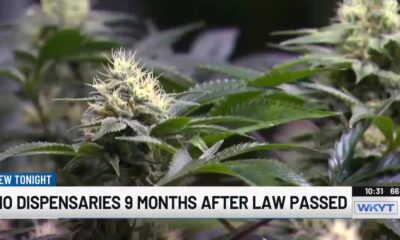Business
The DEA marijuana rescheduling comment period is over. What’s next?
Published
1 year agoon

Monday marks the last date on which the U.S. Drug Enforcement Administration was accepting comments from members of the public on a marijuana rescheduling proposal, which would move cannabis to Schedule III from Schedule I, and as of mid-day, the agency had already received just under 37,000 submissions from interested parties.
But what exactly happens next in the process is about as clear as mud, because the DEA has wide discretion in how fast or how slowly it will move in coming weeks and months, said attorney Shane Pennington, who has made a close study of the rescheduling procedure.
Pennington said it’s been frustrating watching as misinformation swirls online and on social media platforms over how rescheduling may play out because he said too many stakeholders are pushing uninformed theories that suit what they want to see happen.
“It’s so exhausting, all of the misinformation that’s out there,” Pennington said. “People have rose-colored glasses on because they really hope it’ll get done quickly… There are a lot of things that could get thrown in the mix that could make (the rescheduling process move) faster or slower.”

The next move by the DEA, Pennington said, is to sift through all of the comments in order to discern if any of them raise “significant” legal or factual questions that must be addressed. The DEA will also almost certainly find it necessary to issue some level of response to certain comments, depending on their legal thrust, Pennington said.
After that, the DEA could move forward with publishing a final rule in the federal register, but before that the agency will need to decide whether or not to hold an administrative hearing about the rule.
“Really, at any point, before there’s a final rule, they could issue a notice that they’re going to have a hearing. They also might not. No one knows, outside of the government,” he said. “Until we get a final rule, we won’t know if they’re going to have a hearing.”
If that happens, it could stretch out the timeline even more, Pennington warned.
“It’s not possible to give concrete timelines. It is feasible for this to get done before the election. I don’t think it’s feasible if they grant a hearing,” he said. “Generally, hearings take a while, If they’re going to grant one here, I’m sure there would be a big fight, and it would probably push it out past the election. Even apart from that, there’s no guarantee … even if there isn’t a hearing, that it’ll get done before the election, for a number of reasons.”
Once a final rule is published in the federal register, Pennington said, that’ll kick off a 30-day period for opponents to file suit against the move, prior to the rescheduling going fully into effect.
That 30-day period, and the possible outcome of litigation from cannabis reform opponents such as Smart Approaches to Marijuana, could perhaps be the biggest key to whether rescheduling will succeed or not, Pennington suggested.
Once SAM or some other rescheduling foe does file a legal action to block DEA from moving marijuana to Schedule III, they will also likely request an order from the court halting the effective date of the final rule. In deciding on that motion, “the first thing a court will consider is the likelihood of success on the merits,” Pennington said.
“So you’ll have this big showdown, right then, which is extremely important. Because if you get the effective date of the final stayed, it’ll be stayed through the life of the litigation, which could be years,” Pennington said. “That is a real big, big deal.”
“Whoever wins that will also tell you what the court thinks of the merits of the case. It doesn’t decide it, but it tells you if the court thinks there’s a likelihood of success on the merits,” he added.
If those hurdles are all overcome and DEA is still primed to move marijuana to Schedule III, then the final rule will go into effect 30 days after being published in the federal register, at which point the 280E provision of the federal tax code would be nullified for all those in the marijuana trade, Pennington said.
On the misinformation front, Pennington warned against trusting rescheduling enthusiasts online who have been espousing theories that the DEA will be able to digest tens of thousands of public comments in very short order using artificial intelligence or some other technology, or that the DEA will be able to get the rescheduling process finished within a few more weeks.
Neither of those assertions is realistic, he said.
“The work that has to be done is not simple,” Pennington said. “I’m not saying it’s going to take two and a half years. I’m not taking a position on how long it’s going to take. What I am saying is that people who think it is simple and that it’s going to get done instantly because there are AI tools that would make those 30,000 comments look like 10, that is short-sighted. If it does get done quickly, it won’t be because of that.”
First of all, Pennington said, the DEA could wind up with well over 40,000 written comments to read and absorb, given that there’s likely to be a last-minute rush of comments submitted Monday night, including his own, simply because many stakeholders are taking as much time as possible to perfect their submissions.
Rather, Pennington said he believes the DEA will be reviewing all of the comments “the old-fashioned way:” by reading them. That, he said, will take time.
“Right now, I’m working on a 85-page comment myself that’s going to be filed very late in the game. I’m sure others are. And mine, I can assure you, is not a cut-and-paste of anything,” he said.
Then there’s a complex legal question of “standing” at both the administrative hearing level and possibly in any court actions attempting to block rescheduling, another issue that has been oversimplified by many pro-cannabis folks on social media.
“If you don’t have a really sharp, experienced lawyer looking at this, and you just have some dude with an axe to grind on Twitter telling you how standing is going to work, I would take that with a major grain of salt,” Pennington warned. “Questions like these are not little lay-ups. This is the sort of stuff that people make their legal careers off of.”
All of this also doesn’t take into account what could happen if former President Donald Trump wins the election in November, given that Trump hasn’t taken any real position on rescheduling or cannabis reform overall other than a handful of vague statements about leaving such questions to the states. It’s quite feasible that Trump could simply decide to cancel the entire rescheduling move if it’s not completed by the time he takes office in January, or enact a wildly different policy.
The bottom line is there are still many unknowns about how the rescheduling process will play out, Pennington said, and its completion is far from certain.

Author: mscannabiz.com
MScannaBIZ for all you Mississippi Cannabis News and Information.
You may like
-


Federal Marijuana Legalization Bill Deserves Lawmakers’ Support, Letter From ACLU And Other Groups Says
-


Watertown could create new rules for cannabis shops
-


Rhode Island Opens Applications for 24 Adult-Use Dispensary Licenses
-


Kentucky still waiting on medical marijuana dispensaries 9 months after law passed
-


Can LSD Battle Anxiety? The Answer Is Yes, According to Science
-


Six hurt in shooting at marijuana event in SF's Bayview
Business
Nebraska medical cannabis regulations stall in legislative committee
Published
5 months agoon
April 18, 2025

A Nebraska legislative committee voted 5-3 against advancing a bill designed to implement and regulate the state’s medical cannabis program, leaving legislators and advocates searching for alternative paths forward, according to the Nebraska Examiner.
The General Affairs Committee rejected Legislative Bill 677, sponsored by State Sen. Ben Hansen of Blair, during a Thursday vote where committee members declined to offer amendments to the legislation, the publication reported.
“I don’t want to shut all the doors right now, but some doors are closing, and they’re closing fast, and so we have to act,” Hansen told reporters after the vote, according to the Examiner.
Nebraska voters approved medical cannabis in November 2024, with residents legally permitted to possess up to 5 ounces with a healthcare practitioner’s recommendation since mid-December. However, the regulatory commission created by the ballot initiative lacks effective power and funding to regulate the industry.
Hansen described his legislation as “a must” for 2025 to prevent a “Wild West” scenario in the state’s cannabis market. The bill would have expanded regulatory structure through the Nebraska Medical Cannabis Commission and extended deadlines for regulations and licensing to allow more time for implementation, the Examiner noted.
Committee disagreements centered on proposed restrictions. A committee amendment would have prohibited smoking cannabis and the sale of flower or bud products while limiting qualified healthcare practitioners to physicians, osteopathic physicians, physician assistants or nurse practitioners who had treated patients for at least six months.
The amendment also would have limited qualifying conditions to 15 specific ailments including cancer, epilepsy, HIV/AIDS, and chronic pain lasting longer than six months.
State Sen. Bob Andersen of Sarpy County opposed allowing vaping due to concerns about youth drug use, while committee chair Rick Holdcroft suggested selling cannabis flower would be “a gateway toward recreational marijuana,” a claim Hansen “heavily disputed,” according to the Examiner.
Hansen now faces a difficult path forward, requiring at least 25 votes to pull the bill from committee and then needing 33 senators to advance it across three rounds of debate, regardless of filibuster attempts.
Crista Eggers, executive director of Nebraskans for Medical Marijuana, remained optimistic despite the setback.
“This will not be the end,” Eggers said, according to the outlet. “Giving up has never been an option. Being silenced has never been an option. It’s not over. It’s not done.”
The legislative impasse is further complicated by ongoing litigation. Former state senator John Kuehn has filed two lawsuits challenging the voter-approved provisions, with one appeal pending before the Nebraska Supreme Court. The state’s Attorney General is also trying to do something about the hemp question, akin to other states across the country.

Author: mscannabiz.com
MScannaBIZ for all you Mississippi Cannabis News and Information.
Business
One of Las Vegas’ cannabis lounges closes its doors
Published
5 months agoon
April 18, 2025

Nevada’s cannabis lounge experiment faces some expected growing pains, with one of just two state-licensed venues closing its doors after barely a year in business, according to the Las Vegas Weekly.
“The regulatory framework, compliance costs and product limitations just don’t support a sustainable business model,” said Thrive Cannabis managing partner Mitch Britten, who plans to convert the space into an event venue until regulations loosen up.
The closure leaves Planet 13’s Dazed Consumption Lounge as the only operational state-regulated cannabis lounge in Nevada. Dazed manager Blake Anderson estimates the venue attracts around 250 customers daily, primarily tourists. One other establishment, Sky High Lounge, has operated since 2019 on sovereign Las Vegas Paiute Tribe land exempt from state regulations.
Even with Nevada regulators conditionally approving 21 more lounge licenses, potential owners are struggling to meet the $200,000 liquid assets requirement – particularly social equity applicants from communities hit hardest by prohibition.
Recreational marijuana has been legal statewide since 2017, but public consumption remains prohibited. That’s created an obvious disconnect for the millions of tourists who visit Las Vegas annually but have nowhere legal to use the products they purchase. The state recorded roughly $829 million in taxable sales during the 2024 fiscal year.
“It always comes down to money, and it’s difficult to get a space if you can’t afford to buy a building. On top of that, getting insurance and finding a landowner who’s willing to lease to a cannabis business is a challenge in and of itself,” said Christopher LaPorte, whose consulting firm Reset Las Vegas helped launch Smoke and Mirrors, told Las Vegas Weekly.
Many think the key to future success lies in legislative changes that would allow lounges to integrate with food service and entertainment – playing to Las Vegas’s strengths as a hospitality innovator. In the meantime, the industry will continue to adapt and push forward.
“Things take time,” LaPorte said. “There’s a culture that we have to continue to embrace and a lot of education that we still have to do. But at the end of the day, tourists need a place to smoke, and that’s what these places are.”

Author: mscannabiz.com
MScannaBIZ for all you Mississippi Cannabis News and Information.


Psyence Group Inc. (CSE: PSYG) told investors that it will be consolidating all of its issued and outstanding share capital on the basis of every 15 existing common shares into one new common share effective April 23, 2025 with a record date of April 23, 2025. As a result of the consolidation, the issued and outstanding shares will be reduced to approximately 9,387,695 on the effective date.
This is the second time a Psyence company has consolidated shares recently. In November, its Nasdaq-listed associate, Psyence Biomedical Ltd. (Nasdaq: PBM), implemented a 1-for-75 share consolidation as the psychedelics company worked to maintain its Nasdaq listing.
Psyence Group reported earnings in February when the company delivered a net loss of C$3 million and was reporting as a going concern. At the end of 2024, the company said it had not yet achieved profitable operations, has accumulated losses of C$48,982,320 since its inception.
Total assets at the end of 2024 were C$11,944,478 and comprised predominantly of: cash and cash equivalents of C$10,611,113, other receivables of C$159,808, investment in PsyLabs of C$1,071,981 and prepaids of C$68,243.
Still, the company is pushing ahead. Psyence told investors that it has historically secured financing through share issuances and convertible debentures, and it continues to explore funding opportunities to support its operations and strategic initiatives. “Based on these actions and
management’s expectations regarding future funding and operational developments, the company believes it will have sufficient resources to meet its obligations as they become due for at least the next twelve months,” it said in its last financial filing.
The company said it believes that the consolidation will position it with greater flexibility for the development of its business and the growth of the company.

Author: mscannabiz.com
MScannaBIZ for all you Mississippi Cannabis News and Information.

Federal Marijuana Legalization Bill Deserves Lawmakers’ Support, Letter From ACLU And Other Groups Says

Watertown could create new rules for cannabis shops

Rhode Island Opens Applications for 24 Adult-Use Dispensary Licenses

Kentucky still waiting on medical marijuana dispensaries 9 months after law passed

Can LSD Battle Anxiety? The Answer Is Yes, According to Science

Six hurt in shooting at marijuana event in SF's Bayview

Kentucky Medical Marijuana Dispensaries Should Be Stocked With Products Ready For Sale By Next Month, Top State Official Says

Deputies: 3,500 child sex abuse images, marijuana grow operation found in NC home raid

Regulators Ready to Enforce Cannabis Laws on Hemp THC Retailers in Maryland

California reaps over $250 million from 2nd Quarter cannabis sales

Meet the World’s First Cannabis Rugby Team: Crewmen 7’s Tackle Stigma Head-On

Texas Supreme Court Refuses To Take Up Marijuana Case Challenging State’s Rejection Of Local Decriminalization Law

California Passes Bill to Ban Intoxicating Hemp Products Outside Cannabis Market

Pending Federal Hemp Legislation Could Reshape The Legal Industry By Banning Some Products (Op-Ed)

Verano Proposes to Redomicile Parent Company From British Columbia to Nevada

8,000 cannabis plants seized from illegal Bradford grow-op

New York Lawmakers Schedule Psychedelics-Focused Hearing To Discuss ‘Medicinal Value And Risks’ Of Psilocybin

Curaleaf Opens Cannabis Dispensaries in Florida, Ohio

How to Protect Your Outdoor Cannabis Crops From Pests

Feds provide anti-cannabis group a platform to bash legalization (Newsletter: September 15, 2025)

Dozen arrested after south Mississippi bust for illegal sales to underage customers

The Toking Traveler: Why Amsterdam Weed Is Mostly Boof

Arkansas Medical Marijuana Sales Are On Track To Set A New Annual Record

When Cannabis Brands Blur Into Youth Culture, Regulators Notice: Lessons From Tobacco’s Past

Alert: Department of Cannabis Control updates data dashboards with full data for 2023

Connecticut Appoints The US’s First Cannabis Ombudsperson – Yes there is a pun in there and I’m Sure Erin Kirk Is Going To Hear It More Than Once!

5 best CBD creams of 2024 by Leafly

EU initiative begins bid to open access to psychedelic therapies
New Study Analyzes the Effects of THCV, CBD on Weight Loss

Free delta-9 gummies from Bay Smokes

Discover New York’s dankest cannabis brands [September 2024]

5 best autoflower seed banks of 2024 by Leafly

Press Release: CANNRA Calls for Farm Bill to Clarify Existing State Authority to Regulate Hemp Products

Curaleaf Start Process Of Getting Their Claws Into The UK’s National Health System – With Former MP (Resigned Today 30/5/24) As The Front Man

May 2024 Leafly HighLight: Pink Runtz strain

Local medical cannabis dispensary reacts to MSDH pulling Rapid Analytics License – WLBT

Recreational cannabis on ballot for third time in South Dakota

5 best THC drinks of 2024 by Leafly

Horn Lake denies cannabis dispensary request to allow sale of drug paraphernalia and Sunday sales | News

Mississippi city official pleads guilty to selling fake CBD products

6 best CBD gummies of 2024 by Leafly

Nevada CCB to Accept Applications for Cannabis Establishments in White Pine County – “Only one cultivation and one production license will be awarded in White Pine County”

The Daily Hit: October 2, 2024

5 best delta-9 THC gummies of 2024 by Leafly

Weekly Update: Monday, May 13, 2024 including, New Guide for Renewals & May Board meeting application deadline

PRESS RELEASE : Justice Department Submits Proposed Regulation to Reschedule Marijuana

5 best THCA flower of 2024 by Leafly

People In This State Googled ‘Medical Marijuana’ The Most, Study Shows
Trending
-

 California Cannabis Updates1 year ago
California Cannabis Updates1 year agoAlert: Department of Cannabis Control updates data dashboards with full data for 2023
-

 Breaking News1 year ago
Breaking News1 year agoConnecticut Appoints The US’s First Cannabis Ombudsperson – Yes there is a pun in there and I’m Sure Erin Kirk Is Going To Hear It More Than Once!
-

 best list1 year ago
best list1 year ago5 best CBD creams of 2024 by Leafly
-

 Business12 months ago
Business12 months agoEU initiative begins bid to open access to psychedelic therapies
-

 cbd1 year ago
cbd1 year agoNew Study Analyzes the Effects of THCV, CBD on Weight Loss
-

 Bay Smokes1 year ago
Bay Smokes1 year agoFree delta-9 gummies from Bay Smokes
-

 cannabis brands12 months ago
cannabis brands12 months agoDiscover New York’s dankest cannabis brands [September 2024]
-

 autoflower seeds12 months ago
autoflower seeds12 months ago5 best autoflower seed banks of 2024 by Leafly
